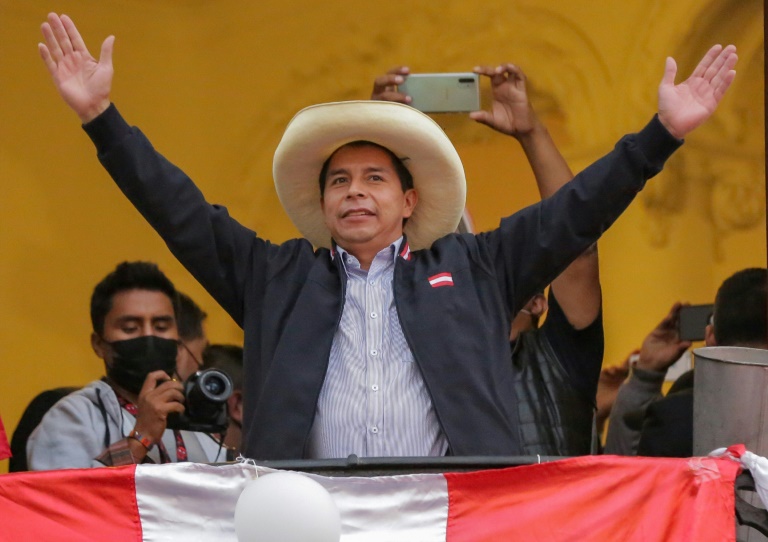Peru was on edge Tuesday as right-wing populist Keiko Fujimori cried foul after far-left rival Pedro Castillo took a narrow lead in the final stretch of vote-counting to decide who will be the country’s next president.
Peruvians voted Sunday for their fifth president in three years after a series of crises and corruption scandals saw three different leaders in the office in a single week last year.
But two days after the vote, the final tally could still be some way off, with ballots trickling into Lima from Peru’s far-flung rural areas — a Castillo stronghold — and from abroad.
Fujimori’s hope rests in large part on the expat vote, with about a million of Peru’s 25 million eligible voters having cast their ballot abroad. But these could still take days or weeks to count.
With just over 95 percent of votes tallied by Tuesday morning, rural school teacher Castillo was ahead with 50.2 percent compared to third-time presidential candidate Fujimori’s 49.7 percent.
Fujimori, 46, had led in early counting, but Castillo, 51, gained ground as votes from Peru’s rural areas started coming in.
Late Monday, Fujimori alleged “irregularities” and “signs of fraud,” telling a press conference she had evidence of “a clear intention to boycott the popular will.”
For Fujimori, the stakes are higher than mere power.
Prosecutors in Peru have said they would seek a prison term of more than 30 years for her on charges of taking money from scandal-tainted Brazilian construction giant Odebrecht to fund presidential bids in 2011 and 2016.
She has already spent 16 months in pre-trial detention. Under Peruvian law, an election victory would see the charges suspended until after her term, but defeat could see her put on trial.
– ‘Rebirth of a new country’ –
Castillo’s Free Peru party has urged election authorities to “protect the vote.”
On Twitter he wrote: “We must be vigilant in defending the democracy that is expressed in each and every vote, inside and outside our beloved Peru. We cannot rest. May this historic vigil enable the rebirth of a new country.”
Peru’s ONPE electoral body dismissed allegations of fraud in the count, and the Civil Transparency Association’s Adriana Urrutia told El Comercio newspaper “There is no evidence that allows us to speak of electoral fraud.”
Amid the uncertainty, the Lima stock market closed 7.82 percent lower Monday and the sol dropped to a record low 3.94 against the US dollar.
An observer mission from the Organization of American States (OAS) said the candidates’ “conduct in these crucial hours is decisive to maintain calm.”
– Polar opposites –
Whoever wins the ideological battle between left and right will take leadership of a nation battered by recession and the world’s worst coronavirus fatality rate with more than 186,000 deaths among its 33 million population.
Peruvians will also be looking for stability, with seven of their last 10 leaders either convicted or are under investigation for graft.
At the height of a political storm in November last year, unleashed by seemingly never-ending corruption claims, Peru had three different presidents in just five days.
In elections to replace the latest caretaker President Francisco Sagasti, Castillo caused an upset by topping the first round of voting in April. Fujimori came second.
The relatively unknown teacher was also consistently ahead of his rival, though narrowly so, in opinion polls ahead of Sunday’s runoff vote that came at a difficult time for Peru.
Two million Peruvians have lost their jobs during the pandemic and nearly a third now live in poverty, according to official figures.
The candidates have polar-opposite recovery plans.
– ‘Communist’ threat –
Fujimori, the daughter of corruption-convicted and jailed ex-president Alberto Fujimori, backs a neoliberal economic model of tax cuts and boosting private activity to generate jobs.
Castillo has pledged to nationalize vital industries, raise taxes and increase state regulation. He has vowed to forego a presidential salary and live on his teacher’s wages.
Favored by the business sector and middle classes, Fujimori — her bastion is the capital Lima — sought to portray Castillo as a communist threat and warned Peru risked becoming a new Venezuela or North Korea.
Rural-based Castillo, in turn, pointed to the Fujimori family’s history of corruption scandals.
Her jailed father, 82, has also been found guilty of ordering two massacres by death squads in 1991 and 1992, and is being probed over the forced sterilization of hundreds of thousands of poor, mostly indigenous women during his term.










